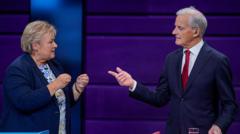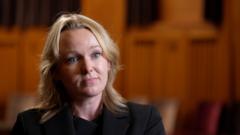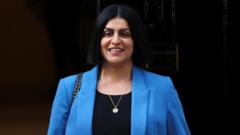Will Norway Choose Labour or Shift Right in a Tight Vote?

Published: 2025-09-07 09:27:05 | Category: world
This article explores the tight race in Norway's upcoming elections, where voters will decide between maintaining a Labour-led government or shifting to a centre-right coalition. Key issues include the cost of living, taxation, foreign policy, and the implications of recent geopolitical events. With a population of just four million, Norway's political decisions resonate beyond its borders, especially regarding its strategic position in NATO and the EU's single market.
Last updated: 12 October 2023 (BST)
Key Takeaways
- The elections will determine if Norway continues with a Labour-led government or shifts to a centre-right coalition.
- Major issues include the cost of living crisis, wealth taxation, and foreign relations, particularly regarding the wars in Gaza and Ukraine.
- Norway's political landscape is influenced by its unique status as a non-EU member with access to the EU single market.
- The outcome may lead to a fragmented parliament with no clear majority due to coalition dynamics.
- Recent actions by Norway's sovereign wealth fund highlight the intersection of domestic politics and international ethical considerations.
The Political Landscape: A Snapshot of Norway
Norway, with its population of approximately four million, stands at a crossroads in its political history as it heads to the polls this Sunday and Monday. The elections are pivotal, not just for the nation but also for its position in an increasingly complex global landscape. The Labour Party, led by Prime Minister Jonas Gahr Støre, is fighting to retain power after a successful term that followed eight years of conservative governance. Støre's government has had to navigate various challenges, including economic pressures, geopolitical tensions, and domestic discontent.
Key Issues at Stake
The current election campaign has seen an intense focus on several pressing issues, primarily driven by the public's concerns about the cost of living and rising inequality. As families grapple with increasing expenses, the government’s ability to manage public spending effectively has become a central theme.
Cost of Living and Inequality
As reported, many voters, like Andreas, a father of a small child, prioritise public spending on schools, infrastructure, and transport. This public sentiment was palpable during Norway's summer politics fest in Arendal, where political leaders engaged in lively debates about the nation's future.
Taxation: The Wealth Tax Debate
One of the contentious issues in this election is the future of Norway's 1% wealth tax, applicable to individuals with assets exceeding 1.76 million Norwegian kroner (£130,000). There is growing dissatisfaction among some wealthy Norwegians, leading to an exodus to countries like Switzerland, where tax burdens are perceived as lighter.
Sylvi Listhaug, leader of the right-wing populist Progress Party, has called for the abolition of this wealth tax, while former Prime Minister Erna Solberg's Høyre party seeks to exempt certain assets, such as shares, from it. In contrast, the Labour Party, while not advocating for its complete removal, has promised a comprehensive review of the tax system, led by Jens Stoltenberg, the former NATO chief.
International Relations and Foreign Policy
Foreign policy has also been a significant aspect of the election discourse, particularly with the implications of the ongoing conflicts in Gaza and Ukraine. Norway's sovereign wealth fund, the largest in the world, has recently made headlines by divesting from Israeli companies amid allegations of human rights violations. Nicolai Tangen, the fund's chief executive, labelled this as a crisis, reflecting the tensions between ethical investment and political pressures.
NATO Membership and EU Relations
While Norway is a founding member of NATO, it remains outside the European Union. It does participate in the EU's single market, which necessitates adherence to EU regulations. The question of EU membership has been a polarising topic, with a significant portion of the electorate still opposed to joining. Although the conservatives advocate for EU membership, both Labour and the right-wing parties have largely sidestepped the issue during this election cycle due to its divisive nature.
Coalition Dynamics and Electoral System
Norway's political system is characterised by proportional representation, meaning that no single party can secure a majority in the 169-seat Storting (parliament). As such, coalition governments are the norm, with a minimum of 85 seats required for a governing majority. The current political landscape suggests that the Labour Party may emerge as the largest party, but the potential for a fragmented parliament could result in complex coalition negotiations.
Potential Outcomes and Implications
If the centre-right bloc, consisting of the Progress Party and the Høyre party, manages to secure power, a key question will be who leads the government. Solberg has hesitated to acknowledge Listhaug's potential as a prime ministerial candidate, indicating possible internal tensions within the coalition. The outcome of the elections could have far-reaching consequences, not only for domestic policies but also for Norway’s role on the international stage.
Looking Ahead: What’s Next for Norway?
As voters head to the polls, the outcomes will shape Norway’s political landscape for years to come. The focus on domestic issues, combined with the backdrop of international crises, paints a complex picture of the challenges ahead. How Norway navigates these challenges will depend significantly on the elected government's policies and their ability to unite disparate elements of the political spectrum.
FAQs
What are the main issues in the Norwegian elections?
The main issues include the cost of living, wealth taxation, public spending, and foreign policy, particularly in light of ongoing international conflicts.
Who are the main political leaders in Norway's elections?
Key figures include Labour Prime Minister Jonas Gahr Støre, Sylvi Listhaug of the Progress Party, and former Prime Minister Erna Solberg of the Høyre party.
What is Norway’s stance on EU membership?
Norway is not a member of the EU but has access to the single market through the European Economic Area. The topic of EU membership remains politically sensitive and is not a focal point in the current election.
How does Norway's electoral system work?
Norway uses a proportional representation system, meaning parties gain seats in parliament based on the percentage of votes they receive. A coalition is often necessary to achieve a governing majority.
What impact has the wealth tax had on Norwegian citizens?
The wealth tax has led to discontent among wealthier citizens, some of whom have moved abroad due to high taxation. The issue is a significant point of debate in the current elections.
As Norway's elections draw closer, the decision made by voters will not only influence domestic policies but also shape the nation's future on the global stage. How will Norway balance its economic needs with its ethical commitments? #NorwayElections #LabourParty #CentreRight



